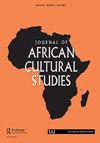Zimbabwean Popular Cultural Expressions of Alternative Sexual Identities
IF 0.9
2区 社会学
Q2 CULTURAL STUDIES
引用次数: 1
Abstract
ABSTRACT The dominant narrative within Zimbabwean popular cultural scholarship largely focuses on the Zimbabwean socio-economic and political crisis at the expense of alternative ideologies, identities and practices. I advocate for the urgency of expansive and wide-ranging epistemological attention to alternative sexual identities as part of a cultural studies research agenda. I argue that, although Zimbabwean homophobia has generally silenced alternative voices, popular culture offers channels through which to engage publicly with that which is generally loathed and feared. I discuss three Zimbabwean popular cultural archives to make the argument that it is through every day cultural practices that Zimbabwean alternative sexual identities can meaningfully be debated and conceptualised. I discuss a Zimbabwean dancehall song titled “Kumba Kwedu” (In Our Home) by the artist named Bazooker, the reception of Facebook activist Tatelicious Karigambe-Sandberg, and Tracy Kadungure’s novel Tanaka Chronicles: The Sexual Awakening. Through the selected popular cultural texts, I show how some Zimbabwean popular cultural expressions of alternative sexualities cleverly undermine heteronormative official values by constantly challenging the assumed heterosexual norm.津巴布韦另类性身份的流行文化表达
摘要津巴布韦流行文化学术界的主流叙事主要集中在津巴布韦的社会经济和政治危机上,而牺牲了其他意识形态、身份和实践。作为文化研究议程的一部分,我主张迫切需要对替代性身份进行广泛的认识论关注。我认为,尽管津巴布韦的恐同症通常会压制其他声音,但流行文化提供了公开参与普遍厌恶和恐惧的声音的渠道。我讨论了三个津巴布韦流行文化档案,以证明正是通过每天的文化实践,津巴布韦的另类性身份才能得到有意义的辩论和概念化。我讨论了一首津巴布韦舞厅歌曲《Kumba Kwedu》(在我们的家里),由一位名叫巴祖克的艺术家创作,Facebook活动家Tatelicious Karigambe Sandberg的招待会,以及Tracy Kadungure的小说《田中纪事:性觉醒》。通过选定的流行文化文本,我展示了津巴布韦一些流行的另类性文化表达是如何通过不断挑战假定的异性恋规范,巧妙地破坏非规范的官方价值观的。
本文章由计算机程序翻译,如有差异,请以英文原文为准。
求助全文
约1分钟内获得全文
求助全文
来源期刊

Journal of African Cultural Studies
Multiple-
CiteScore
1.70
自引率
10.00%
发文量
13
期刊介绍:
The Journal of African Cultural Studies publishes leading scholarship on African culture from inside and outside Africa, with a special commitment to Africa-based authors and to African languages. Our editorial policy encourages an interdisciplinary approach, involving humanities, including environmental humanities. The journal focuses on dimensions of African culture, performance arts, visual arts, music, cinema, the role of the media, the relationship between culture and power, as well as issues within such fields as popular culture in Africa, sociolinguistic topics of cultural interest, and culture and gender. We welcome in particular articles that show evidence of understanding life on the ground, and that demonstrate local knowledge and linguistic competence. We do not publish articles that offer mostly textual analyses of cultural products like novels and films, nor articles that are mostly historical or those based primarily on secondary (such as digital and library) sources. The journal has evolved from the journal African Languages and Cultures, founded in 1988 in the Department of the Languages and Cultures of Africa at the School of Oriental and African Studies, London. From 2019, it is published in association with the International African Institute, London. Journal of African Cultural Studies publishes original research articles. The journal also publishes an occasional Contemporary Conversations section, in which authors respond to current issues. The section has included reviews, interviews and invited response or position papers. We welcome proposals for future Contemporary Conversations themes.
 求助内容:
求助内容: 应助结果提醒方式:
应助结果提醒方式:


